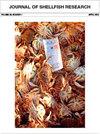腹水对培养贻贝细胞凋亡、自噬和抗氧化能力的影响
IF 1
4区 农林科学
Q3 FISHERIES
引用次数: 0
摘要
摘要海洋双壳类面临多种环境压力,这取决于非生物因素(污染物、盐度和温度)和生物因素的波动,包括海鞘生物污垢。海水温度升高可能会导致海洋动物的氧化应激,而海鞘生物淤积带来的额外负担会缩小它们的热窗,并可能导致贝类健康状况急剧下降,从而对贝类养殖产生影响。本研究的目的是研究海水温度变化在海鞘生物淤积对狭脊贻贝细胞机制造成的应激严重程度中的作用,特别是在抗氧化防御系统中,以及凋亡和自噬途径中。对污染和未污染的贻贝进行季节性采集,并在其地幔和后内收肌组织中确定了上述细胞过程的几个关键指标。结果表明,海鞘生物淤积会增加缺氧条件和氧化应激,从而触发贻贝的细胞死亡途径。尽管海鞘引起的压力可能是进食和氧气消耗减少的结果,但它对贻贝的影响比季节性更大。生物淤积引起的压力,加上夏季水温升高,可能会严重损害贻贝的生理和健康,对水产养殖的可持续性产生不利影响。本文章由计算机程序翻译,如有差异,请以英文原文为准。
Effects of Biofouling by Ascidians on Cultured Mussels: Apoptosis, Autophagy, and Antioxidant Defense
ABSTRACT Marine bivalves are exposed to several environmental stressors depending on fluctuations in abiotic factors (pollutants, salinity, and temperature) and biotic factors, including ascidian biofouling. Increased seawater temperature may lead to oxidative stress in marine animals, whereas the additional burden presented by ascidian biofouling narrows their thermal window and can cause a sharper decline in shellfish health, with subsequent effects on shellfish aquaculture. The aim of the present study was to investigate the role of seawater temperature variations in the severity of the stress caused by ascidian biofouling to Mytilus galloprovincialis cell machinery, particularly in the antioxidant defense system, and the apoptotic and autophagic pathways. Fouled and nonfouled mussels were seasonally collected, and several key indicators of the previously mentioned cellular processes were determined in their mantle and posterior adductor muscle tissues. Results indicate that ascidian biofouling increases hypoxic conditions and oxidative stress, subsequently triggering cell death pathways in mussels. Although the stress caused by ascidians may be the consequence of both reduced feeding and oxygen consumption, it affects the mussels to a greater extent than seasonality. The induced stress by biofouling, along with elevated water temperatures in summer, may severely harm mussel physiology and fitness, adversely affecting aquaculture sustainability.
求助全文
通过发布文献求助,成功后即可免费获取论文全文。
去求助
来源期刊

Journal of Shellfish Research
生物-海洋与淡水生物学
CiteScore
2.30
自引率
0.00%
发文量
40
审稿时长
6 months
期刊介绍:
Original articles dealing with all aspects of shellfish research will be considered for publication. Manuscripts will be judged by the editors or other competent reviewers, or both, on the basis of originality, content, merit, clarity of presentation, and interpretations.
 求助内容:
求助内容: 应助结果提醒方式:
应助结果提醒方式:


